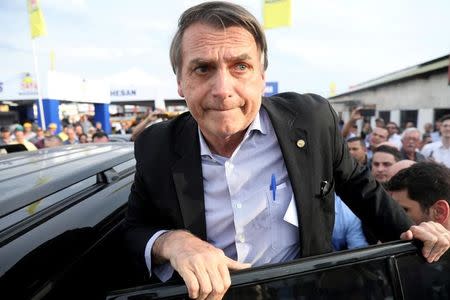Brazil's Bolsonaro camp at odds over reviving loathed tax

BRASILIA (Reuters) - Far-right Brazilian presidential hopeful Jair Bolsonaro's campaign on Wednesday was sharply at odds with the candidate's economic guru over whether a loathed financial transactions tax would return, exposing cracks in the front-runner's team.
The so-called CPMF tax introduced in 1993 as a temporary measure to subsidize Brazil's public healthcare system charged 0.38 percent on all financial transactions, including checks. It was in place until 2007.
Bolsonaro's economic strategist Paulo Guedes said he planned to reintroduce a similar tax, according to a story published on Wednesday by the Folha de S.Paulo newspaper. Guedes has single-handedly won the market's confidence in his candidate - a seven-term congressman who has consistently voted against liberal economic policies
Bolsonaro has already said that if he wins, Guedes would become a "super minister" overseeing Brazil's economy.
The tax on financial transactions would be used to guarantee the solvency of Brazil's social security program while its unsustainable pension system gets overhauled, the newspaper said of the Guedes plan.
The story was immediately refuted by key members of Bolsonaro's team.
"Bolsonaro is not studying the return of the CPMF tax as many media are saying!" Bolsonaro's son Carlos tweeted.
Bolsonaro's running mate, General Hamilton Mourão, told Reuters in a telephone interview that he opposed reviving the tax but it was up to Bolsonaro to decide.
Mourão later said at a campaign stop that restoring the tax would be "shooting oneself in the foot."
A message on Bolsonaro's Twitter account said his economic team was working to reduce the tax burden on Brazilians. "Enough taxes is our motto," it said.
In a later message, Bolsonaro called on his supporters to ignore the "ill-intentioned reports" that he planned to bring back the tax, saying his opponents were trying to cause panic to stop him winning.
Brazil has the highest tax burden in Latin America, with taxation levels that are closer to developed nations.
Presidential candidates for the Oct. 7 vote have vowed not to raise taxes. But the need to reform a cumbersome tax system is espoused by most, along with overhauling a generous pension system that is considered the main cause of Brazil's unsustainable budget deficit.
(Reporting by Ricardo Brito and Marcela Ayres in Brasilia and Pedro Fonseca in Rio de Janeiro; Writing by Anthony Boadle; Editing by Bill Berkrot and Cynthia Osterman)

